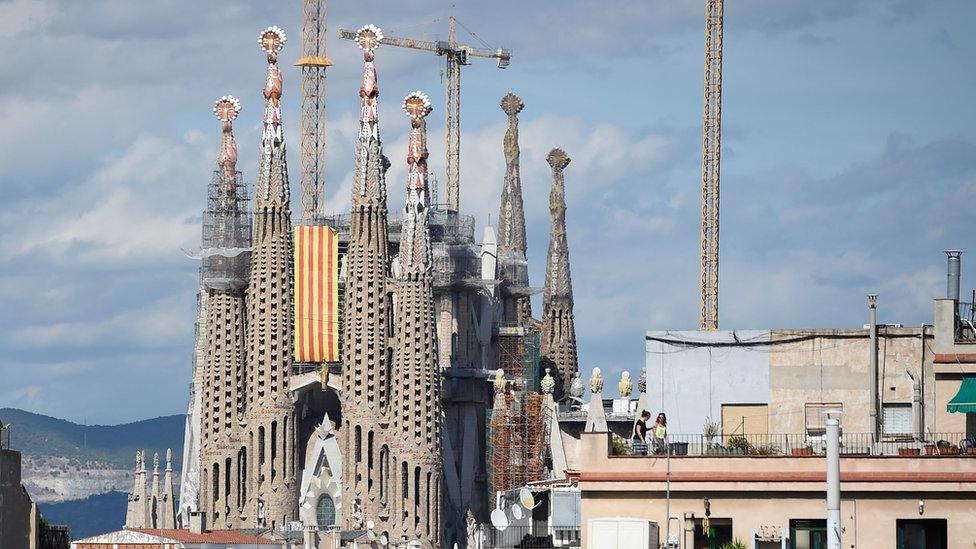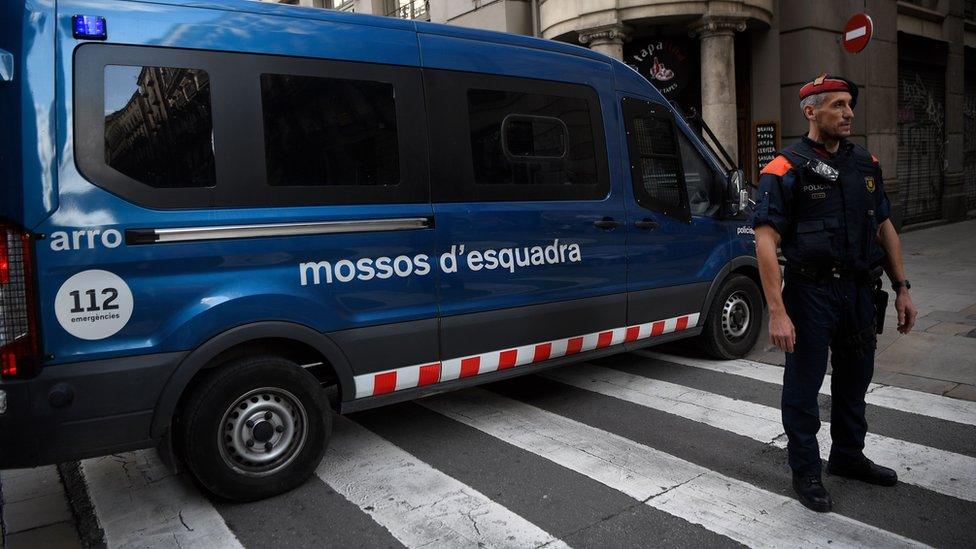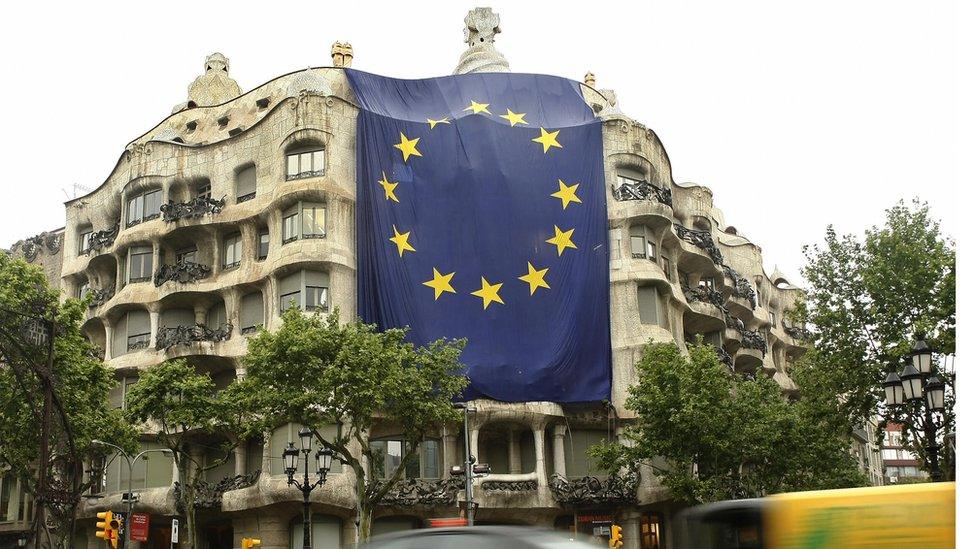Could Catalonia make a success of independence?
- Published

Pro-independence parties have won a slim majority in the Catalan parliament. The regional election backfired on the Spanish government, but for now Madrid remains firmly in control, under emergency powers invoked in October.
What if Catalonia were to secede eventually - would it be able to stand on its own two feet?
Trappings of statehood
To the casual observer, Catalonia looks like it has already got many of the trappings of a state. Flags. A parliament. But its leader, Carles Puigdemont, is in self-imposed exile in Belgium.
The region has its own police force, the Mossos d'Esquadra. It has its own broadcast regulator, and even boasts a series of foreign "missions" - mini embassies that promote trade and investment in Catalonia around the world. Catalonia delivers some public services already - schools and healthcare, for example.
There'd be much more to set up in the event of independence, though. Border control. Customs. Proper international relations. Defence. A central bank. Inland revenue. Air traffic control.
All of these are currently run by Madrid.
But assuming it did create these new institutions - would it be able to pay for them?

Catalonia already has its own police force
Reasons to be cheerful
"Madrid nos roba" is a popular secessionist slogan - "Madrid is robbing us". The received wisdom is that comparatively wealthy Catalonia pays in more than it gets out of the Spanish state.
Catalonia is certainly rich compared with other parts of Spain. It is home to just 16% of the Spanish population, but 19% of its GDP and more than a quarter of Spain's foreign exports.
It punches above its weight in terms of tourism too - 18 million of Spain's 75 million tourists chose Catalonia as their primary destination last year, easily the most visited region.
Tarragona has one of Europe's largest chemical hubs.
Barcelona is one of the EU's top 20 ports by weight of goods handled.
About a third of the working population has some form of tertiary education.
It's also true that Catalans pay more in taxes than is spent on their region.
In 2014, the last year the Spanish government has figures for, Catalans paid nearly €10bn (£8.9bn) more in taxes than reached their region in public spending. Would an independent Catalonia get the difference back?
Some have argued that even if Catalonia gained a tax boost from independence, that might get swallowed up by having to create new public institutions and run them without the same economies of scale.
And some argue that it makes sense for the state to redistribute money from richer to poorer regions in this way.
A harder reckoning
Perhaps of greater concern is Catalonia's public debt.
The Catalan government owes €77bn (£68bn) at the last count, or 35.4% of Catalonia's GDP. Of that, €52bn is owed to the Spanish government.
In 2012, the Spanish government set up a special fund to provide cash to the regions, who were unable to borrow money on the international markets after the financial crisis. Catalonia has been by far the biggest beneficiary of this scheme, taking €67bn since it began.
Not only would Catalonia lose access to that scheme, but it would raise the question of how much debt Catalonia would be willing to repay after independence.
That question would surely cast a shadow over any negotiations. And on top of the sum owed by the regional government - would Madrid expect Barcelona to shoulder a share of the Spanish national debt?

Many Catalans are proud to be EU citizens - that might be tricky to maintain after independence
Involuntary Catalexit?
The uncertainty created by the struggle for independence has already hit the Catalan economy.
More than 3,100 companies have moved their legal headquarters out of the region, including major banks Caixabank and Banco de Sabadell.
At least part of the uncertainty is over Catalonia's relationship with Europe.
Two-thirds of Catalonia's foreign exports go to the EU. It would need to reapply to become a member if it seceded from Spain - it wouldn't get in automatically or immediately.
And it would require all EU members to agree - including Spain.
Some in the pro-independence camp feel that Catalonia could settle for single-market membership without joining the EU. Catalans may well be happy to pay for access, and continue to accept free movement of EU citizens across the region's borders.
But if Spain chose to, it could make life difficult for an independent Catalonia.
There is also the question of currency.
In 2015, the governor of the Bank of Spain warned Catalans independence would cause the region to drop out of the euro automatically, losing access to the European Central Bank.
Normally, new EU member states must apply to join the euro.
They have to meet certain criteria, external, such as their debt not being too large a percentage of their gross domestic product (GDP).
Even if they meet those criteria, a qualified majority of eurozone countries has to approve their entry.
In theory, that means even if Catalonia became a new EU member state, it may well take time to rejoin the eurozone - and Spain and its allies could block that.
In practice, we just don't know what would happen.
Nobody has ever declared independence from a member of the eurozone then asked to rejoin as a new country.
Could Catalonia use the euro without joining the eurozone? It does happen.
Some countries such as San Marino and Vatican City do so with the eurozone's blessing, since they're too small to ever become EU member states.
Others, such as Kosovo and Montenegro, use the euro without the EU's blessing, and so don't have access to the European Central Bank.
Again, whether either solution would be practical in Catalonia remains to be seen.



- Published30 September 2017

- Published2 October 2017

- Published3 October 2017
